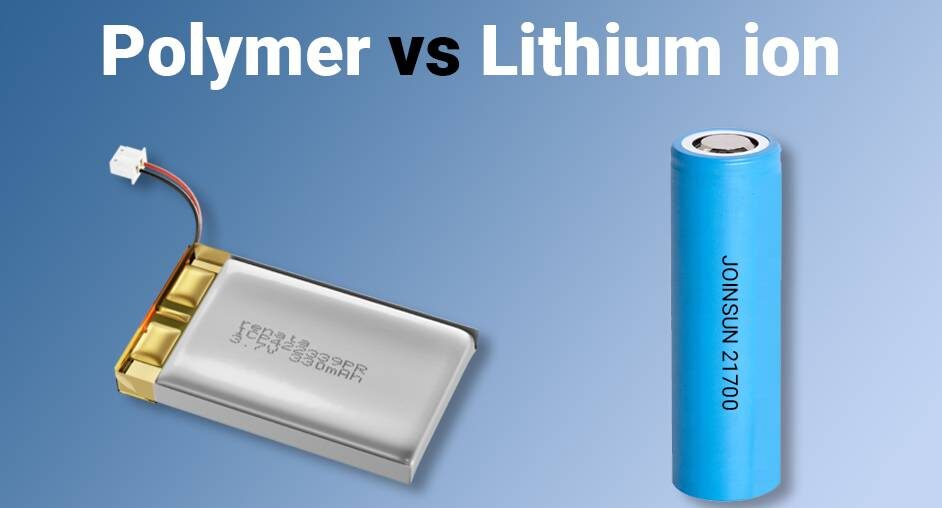When it comes to rechargeable batteries, lithium-ion (Li-ion) and lithium-polymer (LiPo) are the two most common types. You’ll find them in phones, laptops, electric vehicles, and many other devices. While they have some similarities, they also have key differences in design, performance, and use. In this article, we’ll look at the key differences between these two battery types and help you decide which one is better for your needs.
1. Battery Design
The main difference between lithium-ion and lithium-polymer batteries is how they are made.
Lithium-ion batteries use a liquid electrolyte, which is a gel-like substance that helps the battery store and release energy. These batteries are typically housed in a rigid metal casing that can be cylindrical or rectangular.
Lithium-polymer batteries use a solid or semi-solid polymer electrolyte. This allows them to be thinner and more flexible than lithium-ion batteries. Because of this, lithium-polymer batteries can be made in a variety of shapes and sizes, which is useful for compact devices.
2. Size and flexibility
Lithium-polymer batteries are lighter and more flexible than lithium-ion batteries. They can be made in custom shapes and sizes, making them ideal for devices like smartphones, drones, and other gadgets where space is limited.
Lithium-ion batteries, with their rigid metal casings, are typically bulkier. While they are getting smaller, they are still less flexible in terms of design.
3. Energy density and capacity
Lithium-ion batteries typically have a higher energy density, which means they can store more energy in a given space. This is why lithium-ion batteries are often used in larger devices, such as laptops and electric vehicles, where long battery life is important.
Lithium-polymer batteries have a slightly lower energy density, so they don’t last as long on a single charge as similarly sized lithium-ion batteries. However, their flexibility and ability to fit into small spaces make them a better choice for smaller devices.
4. Weight
Since lithium-polymer batteries are made of lighter materials, they are generally lighter than lithium-ion batteries. This makes them ideal for portable devices where weight reduction is important, such as wearables, drones, and smartphones.
Lithium-ion batteries are heavier, which is fine for larger devices where weight is not a concern.
5. Safety
Both types of batteries are generally safe when used properly, but lithium-ion batteries can sometimes overheat or swell, which can cause a fire if damaged. This is because liquid electrolytes are more volatile.
Lithium-polymer batteries are safer in this regard because solid or semi-solid electrolytes are more stable and less likely to leak or catch fire. However, they can still be damaged if punctured or handled incorrectly.
6. Charging speed
Lithium-polymer batteries often charge slightly faster than lithium-ion batteries. This is because they have lower internal resistance, which allows them to store more power in a shorter time.
Both types of batteries can charge quickly, but lithium-polymer batteries have the edge when it comes to charging speed, making them ideal for devices like drones that need to recharge quickly.
7. Price
Lithium-ion batteries are generally cheaper than lithium-polymer batteries. This is because lithium-ion technology is more widely used and cheaper to manufacture.
Lithium-polymer batteries are more expensive because they require a more complex manufacturing process. However, the price difference is not large, especially for smaller devices.
8. Durability and lifespan
Lithium-ion batteries generally last longer in terms of total charge cycles. They can handle 300 to 500 charge cycles before they start to degrade. This means that lithium-ion batteries are a better choice for devices that are heavily used and require a long lifespan.
Lithium-polymer batteries can drain faster, but the difference in lifespan is usually not a major issue for most devices.
Which Type Is Better?
Which type of battery is better depends on your specific needs:
If you need a battery with a long lifespan and high energy density, lithium-ion is a good option. It’s great for devices like laptops and electric vehicles where long battery life is important.
If you need a battery that’s lightweight, flexible, and can fit into a small space, lithium-polymer is the way to go. It’s ideal for portable electronics like smartphones, wearables, and drones.
Conclusion
In summary, both lithium-ion and lithium-polymer batteries have their strengths. Lithium-ion batteries are known for their high energy density, long life, and reliability. On the other hand, lithium-polymer batteries offer flexibility, lightweight, and safety. Your choice will depend on the device you are using and the specific features you need, whether it is long battery life or a compact, flexible design. Both types of batteries offer excellent performance and are widely used in today’s technology.
Magnificette is a well-known marketplace for electronic components. We carefully select our products, including cables, wires, power supplies, modules, semiconductors, integrated circuits (ICs) and more. All our items are designed with the latest technology and meet current industry standards, ensuring high quality and reliability.


